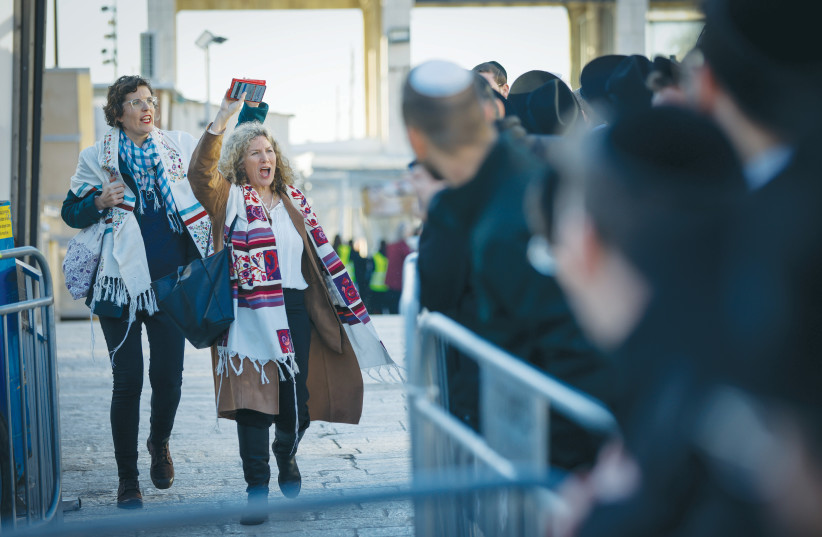The Magistrate's Court delivered a significant verdict on Wednesday regarding the rules governing inspections at the entrance to the Western Wall plaza.
In a lawsuit filed by Anat Hoffman and Tami Gottlieb from the Women of the Western Wall group, the court stipulated that the entrance inspection shall be conducted in alignment with the Law of Powers for the Protection of Public Security, 2005. The provisions ensure that the main goal of these checks is to keep everyone safe from potential threats or harmful actions.
Importantly, the court ruled that there shouldn't be any special searches just to find Torah scrolls, used by WoW in their services. This means that if someone is carrying a Torah to the Western Wall, they will not be stopped or searched just because of that.
Furthermore, the court emphasized that these checks should be fair and unbiased. According to this verdict, nobody should be singled out based on their gender, religious beliefs, or practices. This is especially relevant for WoW, a group that's been at the heart of this discussion.
According to the court, they will simply go through the same standard security checks as everyone else. These rulings by the court aim to ensure that visits to the Western Wall are welcoming and free from prejudice.

Case opened in November 2020
This case stemmed from an incident on November 17, 2020, where the plaintiffs alleged discriminatory security checks upon entering the Western Wall complex. They argued that the intent behind the check was to detect the presence of Torah scrolls in their belongings.
Management sources from the Western Wall plaza confirmed on Thursday to The Jerusalem Post that the "ban on bringing Torah scrolls into the Western Wall plaza remains a valid procedure." They further clarified that guards from the Western Wall Heritage Foundation "are authorized to implement all site-specific procedures, which includes the ban on bringing Torah scrolls into any part of the Western Wall area, encompassing the checkpoints at its entrances." The sources also highlighted a delineation of duties: "The security guards will focus on safety enforcement, while the ushers of the Western Wall Heritage Foundation will ensure adherence to the site's procedures."
Anat Hoffman, one of the plaintiffs and chairman WoW, hailed the verdict as a massive victory. She commented, "For the first time, the Western Wall Heritage Foundation will not be able to enforce an extreme, discriminatory and exclusionary policy towards women at the Western Wall." She added that women will no longer face intrusive searches for Torah scrolls, comparing such searches to looking for a "ticking time bomb."
Ori Narov, director of the legal department at the Israel Religious Action Center and the attorney representing the WoW, affirmed the court's decision, stating that any attempt to enforce the security check in order to prevent women from bringing Torah scrolls to the Western Wall plaza is "illegal and invalid."
The Western Wall Heritage Foundation responded to this decision and said: "WoW filed a personal lawsuit against the Western Wall's rabbi and the Western Wall Heritage Foundation, a lawsuit that was similarly rejected." The added that "the court reflected the existing reality in accordance with the decision of the Supreme Court, in which the security guards provide security, and ushers enforce regulations."
"The court ruled that the procedure of not allowing the entry of a Torah scroll is legal," the foundation said, adding that "WoW turned their failure into a victory."
The implications of this verdict on the ground rules of the Western Wall, a site sacred to millions worldwide, remain to be seen. But for now, it stands as a crucial decision in the ongoing discourse surrounding freedom of religious expression in the region.
World Zionist Organization (WZO) vice chairman Dr. Yizhar Hess, who is the representative of the Conservative Movement in the WZO added that "today’s court decision restores sanity to the security checkpoints at the Kotel. Instead of focusing on searching for weapons and explosives, the Kotel Rabbi’s security guards have long searched for Torah scrolls, heaven forbid a woman read from the Torah and 'endanger public security.'
"This absurdity has now come to an end. For years, Rabbi [Shmuel] Rabinowitz has acted as if he has absolute sovereign power at the Kotel like the Pope at the Vatican, going as far as to send security forces after fellow Jews coming to pray peacefully.
"Today, the court put an end to this madness. This is great news for millions of women worldwide,” Hess concluded.
